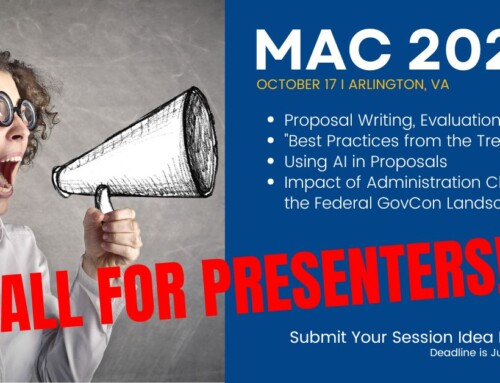You have a lot on your plate. You’ve got 5 projects that must run right, staffing problems to stay on top of, and then you must make sure your invoices get paid and meet payroll. It is easy to push marketing to the back burner so you can get everything else done. But those 5 projects are going to come to an end at some point, and then you’ll need new ones to replace them. What is the fastest way to keep that opportunity pipeline filled? Here are 4 ideas:
1. Know your Unique Selling Proposition
You and your company will be much more memorable if you have a clear and compelling answer to the question, “Why should I buy from you?” Your elevator pitch should succinctly and compellingly describe how you solve client problems and how you are different form your competitors. Relevant attributes include the following:
- What you do. (technology, product, or service)
- How you do it. (service attributes like attention to detail, timeliness, creativity, cost)
- Who you know. (agency experience and connections to constituent groups)
- What you know about. (subject matter expertise)
Don’t try to tell the WHOLE story of your offering in the elevator pitch. Just give them enough so that they want to learn more.
By nature, we humans are self-centered. We see the world in a certain way and struggle to see it from another person’s point of view (POV). To successfully market your company, you must adopt the buyer POV and appeal to her/his needs:
- What do they worry about every day?
- How is their agency/industry/office changing?
- How is their office or agency under outside pressure? Has the GAO recently published a report on them? How do they prove to Congress they should be funded?
Then dig deep into FPDS, GovWin, GovPurchase, or the other databases to understand their buying behaviors:
- How do they buy what you sell? What mechanism and means of procurement?
- When do they buy? What are they buying soon?
- How do they define quality in the purchase decision?
- Who are they buying from right now? Why? Are these firms competitors, partners, or both?
3. Hang Out where the Buyer Does
It can be nearly impossible to get a government buyer to answer your call or return your email. Why? Because their workdays are jam packed just like yours! Better to get their attention by hanging out at their “water coolers.” Where do your buyers keep current about industry trends, listen to thought leaders, and meet new contacts? Places like…[intense_blockquote width=”33%” rightalign=”1″]We all got into business because we wanted to do the stuff we love; marketing is a necessary means to that end.[/intense_blockquote]
- Conferences, trade meetings
- Trade magazines, newsletters, websites
- Industry days at their agency
- Social media: Twitter, Facebook, LinkedIn
What can you do to get noticed at the water cooler?
- Give away some of your intellectual property (IP) to show how smart you are
- Offer a free trial or assessment survey to show them how much they need your offering and to get them interested in learning more from you
- Introduce yourself to potential customers and get permission to follow up with them later
- Remember you have something they need–you are an expert in what you do — and they need to keep current on trends in your industry
4. Make Friends and Go Further with Partners
Partnerships are critical for any contractor if they are going to reach the full potential. Yet company leaders shy away from partnerships for good reasons.
- It takes work to make them happen
- It takes more work to make decisions
- Big fish abuse the small fish (like me)
- A partner may steal what I know (or my staff) and leave me out in the cold when they don’t need me anymore
But without partners you will find it much harder to
- Gain access to a new agency/office, contracting mechanism, or set-aside
- Expanded qualifications, capabilities
- Learn from them (them from you, too)
Partners help you to expand your horizons and get into new lines of business. You can mitigate the risks with a good set of legal documents like NDAs, teaming agreements, and subcontract templates. Partners can help you access work that is not otherwise available and help you keep current.
We all got into business because we wanted to do the stuff we love; marketing is a necessary means to that end. Take a tip from the master marketers and make the best use of your business development resources by clearly defining your offering, understanding the needs of your buyer, taking advantage of public venues (water coolers) to meet them, and by using partners to expand your horizons. Happy hunting!





Leave A Comment